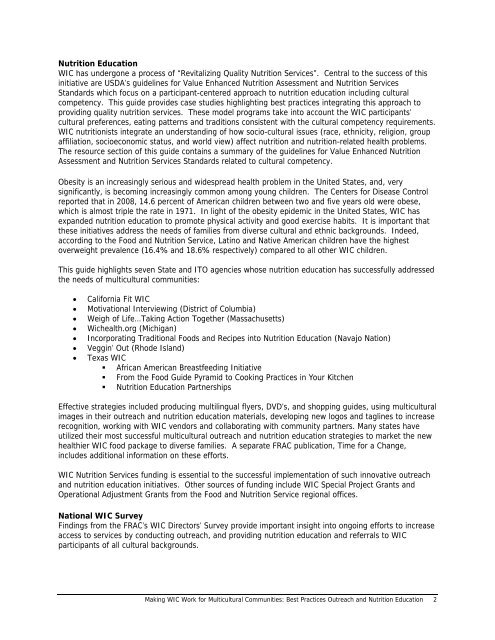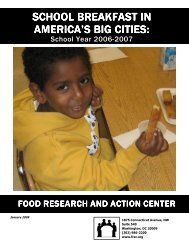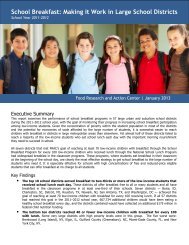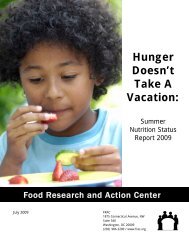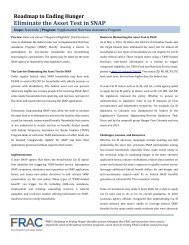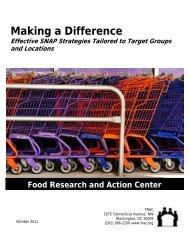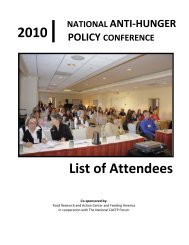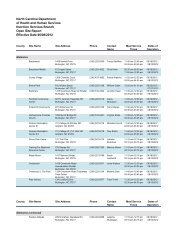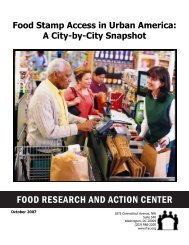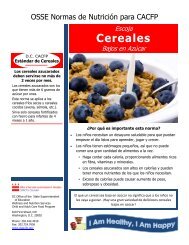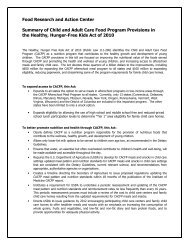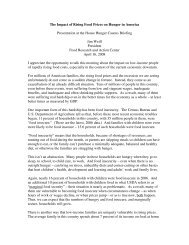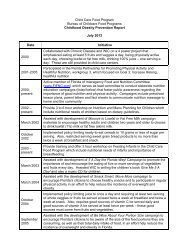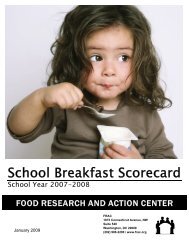Making WIC Work for Multicultural Communities - Food Research ...
Making WIC Work for Multicultural Communities - Food Research ...
Making WIC Work for Multicultural Communities - Food Research ...
Create successful ePaper yourself
Turn your PDF publications into a flip-book with our unique Google optimized e-Paper software.
Nutrition Education<br />
<strong>WIC</strong> has undergone a process of “Revitalizing Quality Nutrition Services”. Central to the success of this<br />
initiative are USDA’s guidelines <strong>for</strong> Value Enhanced Nutrition Assessment and Nutrition Services<br />
Standards which focus on a participant-centered approach to nutrition education including cultural<br />
competency. This guide provides case studies highlighting best practices integrating this approach to<br />
providing quality nutrition services. These model programs take into account the <strong>WIC</strong> participants’<br />
cultural preferences, eating patterns and traditions consistent with the cultural competency requirements.<br />
<strong>WIC</strong> nutritionists integrate an understanding of how socio-cultural issues (race, ethnicity, religion, group<br />
affiliation, socioeconomic status, and world view) affect nutrition and nutrition-related health problems.<br />
The resource section of this guide contains a summary of the guidelines <strong>for</strong> Value Enhanced Nutrition<br />
Assessment and Nutrition Services Standards related to cultural competency.<br />
Obesity is an increasingly serious and widespread health problem in the United States, and, very<br />
significantly, is becoming increasingly common among young children. The Centers <strong>for</strong> Disease Control<br />
reported that in 2008, 14.6 percent of American children between two and five years old were obese,<br />
which is almost triple the rate in 1971. In light of the obesity epidemic in the United States, <strong>WIC</strong> has<br />
expanded nutrition education to promote physical activity and good exercise habits. It is important that<br />
these initiatives address the needs of families from diverse cultural and ethnic backgrounds. Indeed,<br />
according to the <strong>Food</strong> and Nutrition Service, Latino and Native American children have the highest<br />
overweight prevalence (16.4% and 18.6% respectively) compared to all other <strong>WIC</strong> children.<br />
This guide highlights seven State and ITO agencies whose nutrition education has successfully addressed<br />
the needs of multicultural communities:<br />
• Cali<strong>for</strong>nia Fit <strong>WIC</strong><br />
• Motivational Interviewing (District of Columbia)<br />
• Weigh of Life…Taking Action Together (Massachusetts)<br />
• Wichealth.org (Michigan)<br />
• Incorporating Traditional <strong>Food</strong>s and Recipes into Nutrition Education (Navajo Nation)<br />
• Veggin’ Out (Rhode Island)<br />
• Texas <strong>WIC</strong><br />
African American Breastfeeding Initiative<br />
From the <strong>Food</strong> Guide Pyramid to Cooking Practices in Your Kitchen<br />
Nutrition Education Partnerships<br />
Effective strategies included producing multilingual flyers, DVD’s, and shopping guides, using multicultural<br />
images in their outreach and nutrition education materials, developing new logos and taglines to increase<br />
recognition, working with <strong>WIC</strong> vendors and collaborating with community partners. Many states have<br />
utilized their most successful multicultural outreach and nutrition education strategies to market the new<br />
healthier <strong>WIC</strong> food package to diverse families. A separate FRAC publication, Time <strong>for</strong> a Change,<br />
includes additional in<strong>for</strong>mation on these ef<strong>for</strong>ts.<br />
<strong>WIC</strong> Nutrition Services funding is essential to the successful implementation of such innovative outreach<br />
and nutrition education initiatives. Other sources of funding include <strong>WIC</strong> Special Project Grants and<br />
Operational Adjustment Grants from the <strong>Food</strong> and Nutrition Service regional offices.<br />
National <strong>WIC</strong> Survey<br />
Findings from the FRAC’s <strong>WIC</strong> Directors’ Survey provide important insight into ongoing ef<strong>for</strong>ts to increase<br />
access to services by conducting outreach, and providing nutrition education and referrals to <strong>WIC</strong><br />
participants of all cultural backgrounds.<br />
<strong>Making</strong> <strong>WIC</strong> <strong>Work</strong> <strong>for</strong> <strong>Multicultural</strong> <strong>Communities</strong>: Best Practices Outreach and Nutrition Education 2


